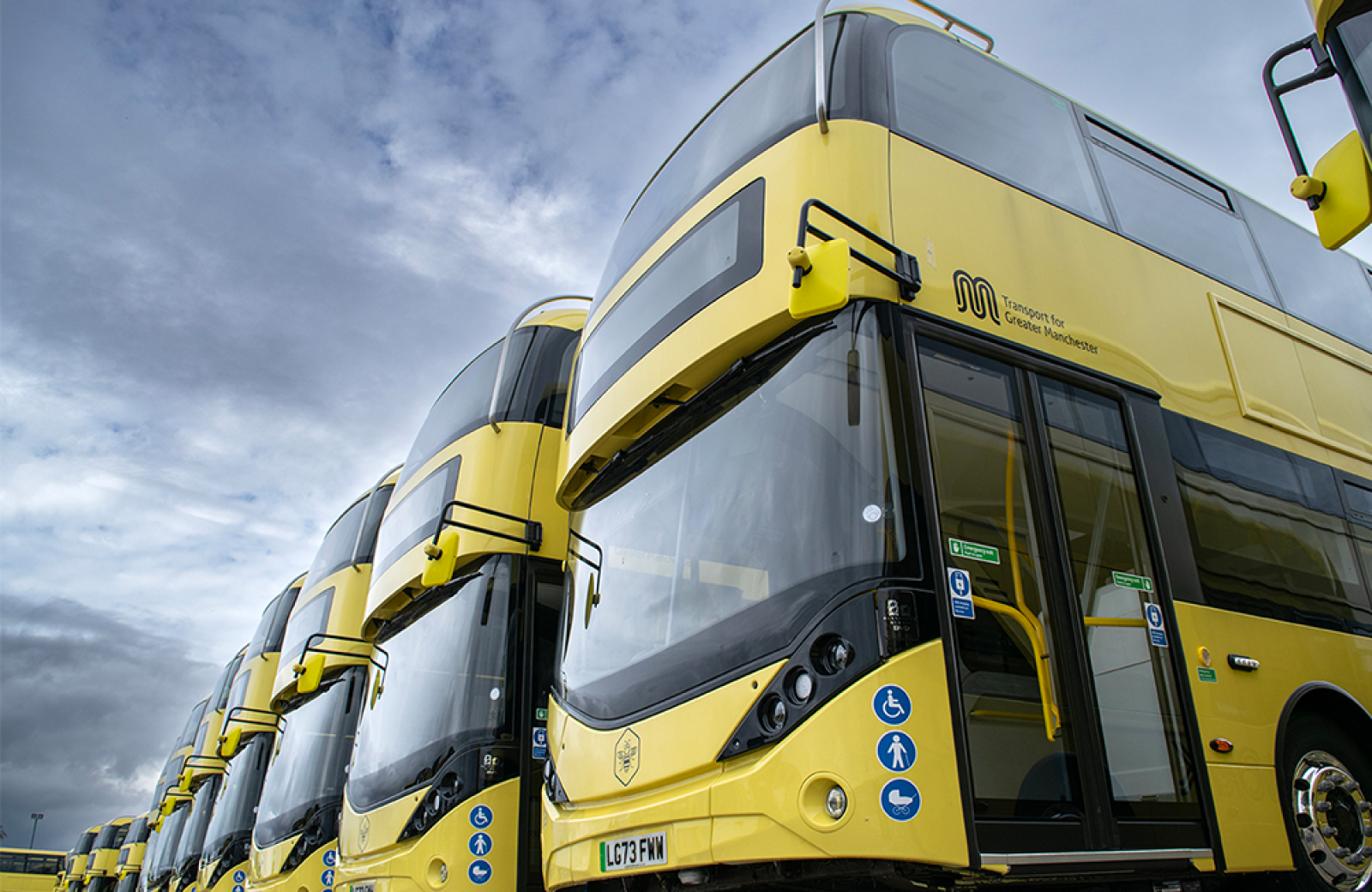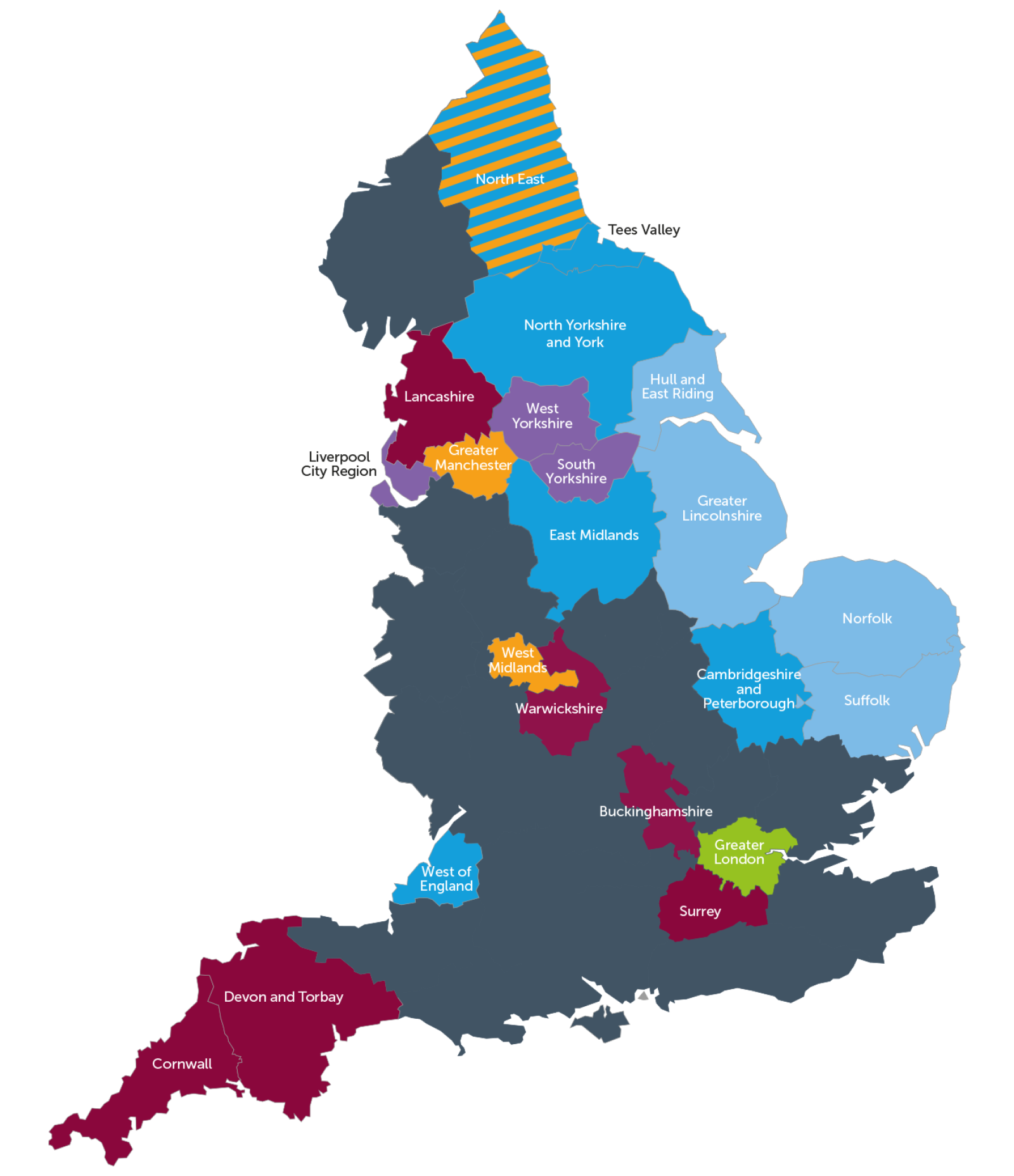All eyes on devolution

There are quite a few policy issues that political parties vigorously disagree over. However, it seems that English devolution has arrived at a point of true political convergence. All parties recognise and praise the role that regional devolution and decentralisation play in unlocking growth and placemaking, tackling regional inequality and enabling the creation of more efficient, integrated transport networks. But how did we get here?
The journey thus far
The journey of English devolution can be traced back decades, possibly even a whole century, but most visible progress has taken place over the last 10 years. A decade after Greater Manchester agreed its first devolution deal in 2014, there are now 22 devolution deals across England, covering around two thirds of the nation’s population (although 10 of these still require local and Parliamentary ratification).
Currently, such deals are split into 4 Levels (see the below map and explanatory legend) as well as ‘Trailblazers’, and then London, which sits outside the English Devolution framework due to its unique long term legislative arrangements.

Red – Level 2: single institution without an elected mayoralty; Control of appropriate local transport functions with the single institution becoming the LTA.
Blue – Level 3: (light blue – deal offered): a single institution with a directly-elected Mayor or Leader; access to significant devolved transport powers, including a consolidated longer term local transport funding (CRSTS – capacity and capability tested) and automatic access to franchising powers.
Purple – Level 4: a single institution with a directly-elected Mayor or Leader; access to Single local transport funding settlement and power of direction over the Key Route Network.
Orange – Trailblazer: a single institution with a directly-elected Mayor with most expanded powers and simplified funding arrangement through a longer-term, streamlined, department-style funding settlements.
The most significant developments in the devolution of transport functions and funds (beyond Greater London - which is now the only major city region without a long-term funding deal) have taken place in Greater Manchester and West Midlands through Trailblazer deals. These deals, agreed in 2023, have focused on simplifying funding arrangements, providing more flexibility, and granting powers that would support the creation of integrated cross-modal transport networks. From the next Spending Review period these areas will receive a longer-term, streamlined, department-style funding settlement, providing greater certainty and flexibility.
Earlier this year, the next level of devolution, Level 4 – effectively the next step towards a Trailblazer deal - was introduced in the devolution framework, offering access to further levers on local transport as well as the promise of a single pot transport settlement to eligible areas.
Latest Devo deals
Over the last few years, Metro Mayors have become highly visible figureheads, most often operating beyond party politics. This month saw some dramatic electoral battles take place across most combined authorities, including the three most recently established mayoralties – North East, East Midlands, and York and North Yorkshire.
Both East Midlands County Combined Authority and York and North Yorkshire Combined Authority have Level 3 deals with directly elected Mayors. Whilst the North East Mayoral Combined Authority (NEMCA), which replaces the North of Tyne MCA, has signed a deal, which combines elements of Level 4 and Trailblazers. As part of the 2024 Spring Budget, the Chancellor announced Level 2 devolution deals for Buckinghamshire, Warwickshire and Surrey, giving the counties powers over adult education and infrastructure.
You can find a breakdown of what general transport powers are featured in the different levels of devolution deals here. It’s important to note that each deal features place-specific language and powers.
What’s next for devolution?
Given that in practice, English regional devolution is still in its forming stage there’s clearly significant space left for deepening powers and empowering local leaders. This should include expansion of truly devolved funds to all MCAs, granting of spatial powers to enable more integrated place making, clarity on Combined Authority and Mayor role in rail, and fiscal devolution. A staggering 95p in every £1 paid in tax is collected by Whitehall, in stark comparison – the gap narrows to 69p in the pound by central government in Germany. Lack of action on fiscal devolution and deepening of powers will continue to stifle the real extent of the opportunity that devolution could unlock.
With a General Election approaching, it’s promising, however, that political parties thoroughly agree on the opportunity that devolution presents and are committed to building on the progress made.
The Labour Party has in the last few months highlighted this in their plans on Bus reform, which we were pleased to see included many ‘asks’ made by the Urban Transport Group in our A Smoother Ride report on bus legislation. Devolution was also highlighted in Labour’s campaign document Power and Partnership: Labour’s Plan to Power Up Britain, featuring commitments to empowering local communities through giving Mayors access to new powers over transport, skills, housing, planning, employment support and energy, supported by long-term integrated funding settlements. Most recently, the role of Mayors and transport authorities was also recognised in Labour’s Plan for Rail.
The Conservative Party is yet to release detailed plans or commitments on devolution in relation specifically to the next General Election. However, given the progress achieved over the last 10 years has taken place under Conservative Prime Ministers, it’s unlikely the party would want to row back on, for example, promised funding devolution for Trailblazers and Level 4 regions, or the various deals offered to areas across England.
The last two decades have seen English devolution take shape. Whilst we celebrate the progress made, there is still more to be done to ensure the true prize of devolution can be delivered.
Monta Drozdova is Policy and Research Advisor at the Urban Transport Group

